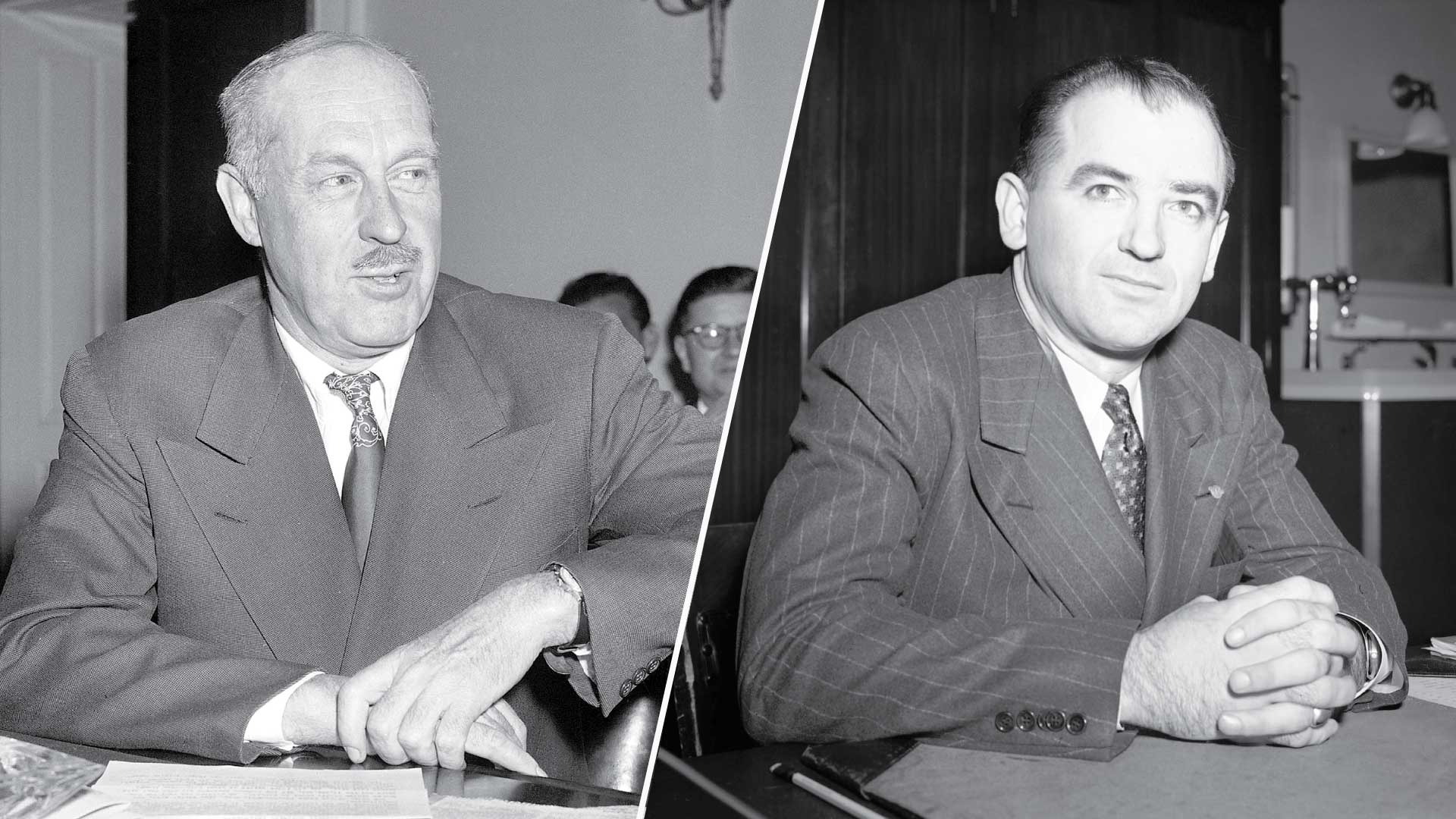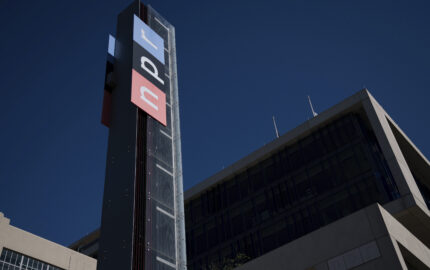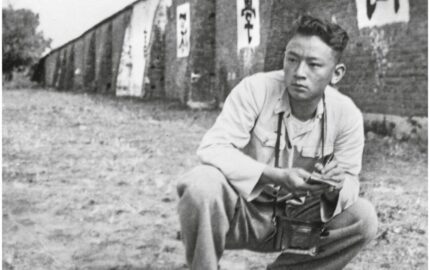It was a battle for the ages and a template for today.
The most loathed of U.S. Senator Joe McCarthy’s press prey in the early days of his Red-baiting crusade was America’s best-read journalist, Andrew Russell “Drew” Pearson. Pearson’s eight weekly “Merry-Go-Round” columns were printed in 600 daily and weekly newspapers with a combined circulation of 40 million. Every Sunday night in that Golden Age of radio, 20 million listeners pulled their chairs and sofas around the 2-foot-high Philco console, the brown Bakelite dial carefully tuned to the blend of news and gossip delivered staccato-like in “Drew Pearson Comments.” No correspondent in America wielded more clout. Nobody was a more faithful heir to the Progressive Era’s muckrakers or did more to beget the Watergate-era whistleblowers. And, from the late 1940s through the mid-’50s, no public figure aroused Pearson’s ferocious ire more regularly than the finger-pointing senator from Wisconsin.
Pearson penned 58 columns on McCarthy, all scathing, in the months after the senator charged that the U.S. Department of State was riddled with subversives. “Senator McCarthy is way off base,” Pearson wrote in February 1950. “The alleged Communists which he claims are sheltered in the State Department just aren’t.” Three weeks later the columnist blasted McCarthy for a “witch hunt,” saying he “has disrupted our entire foreign service.” By April, Drew was branding Joe “another Huey Long. Like the Louisiana Kingfish, Joe McCarthy has an engaging manner, great personal charm, tremendous energy and an insatiable desire for putting headlines ahead of public welfare.” The Merry-Go-Round was relentless, and his audience wasn’t just the public but journalists who were too busy or browbeaten to do inquisitions of their own.
Drew Pearson’s gutsy role in taking on and bringing down Joe McCarthy has been lost to history, thanks in part to Hollywood. The narrative that stuck, in movies like “Good Night, and Good Luck,” cast legendary CBS broadcaster Edward R. Murrow as the public executioner of the bullying senator, even though Murrow himself confessed that he was late to the fight.
Pearson divined in McCarthy a witch-hunter who couldn’t snare a witch — precisely the sort of faker he’d spent his career ferreting out. The columnist was a Washington player who, for the sake of a better story, didn’t hesitate in allowing his legmen to misrepresent themselves to unsuspecting officials or otherwise bend the rules. Yet his exposés generally were on target, and his prey almost always deserved whatever he hit them with. That’s what kept readers coming back to his column for an unheard-of 37 years, and what kept Drew coming back to Joe. He published rumors he could pin down, and leaked to other journalists or held for future fodder less substantial ones on topics as explosive as McCarthy’s sexual preferences and his alleged ties to the Al Capone gang. The columnist even had a paid informant in Joe’s Senate office. “McCarthyism was to him the ultimate windmill,” explained Pearson’s sidekick Jack Anderson, “the clear and present danger.”
The obsession was mutual, as is clear from the senator’s personal and professional papers that were donated 60 years ago to his alma mater Marquette University and were made available, for the first time, for my new book “Demagogue: The Life and Long Shadow of Senator Joe McCarthy,” published July 7 by Houghton Mifflin Harcourt. McCarthy kept tabs as well as files on Pearson partly because of the columnist’s reach in Wisconsin and across the land. But there was more to it. Drew had started out evenhanded and at times friendly, and Joe fed him juicy tidbits. The journalist’s turning on the senator was, in McCarthy’s Irish-tough world, an unpardonable breaking of faith. He also saw Pearson as an exemplar of the Washington establishment he detested and an archenemy of his Middle America. What irked Joe most was that Drew seemed to be the one press person he couldn’t easily counterattack the way he did when he threatened to out columnist Joe Alsop as gay and branded Wisconsin editor Cedric Parker a pinko. Pearson was married, and bled red, white, and blue, with a longer, deeper anti-Communist résumé than the senator. And he didn’t scare.
Joe was seething — and plotting. He kept by his bedside a baseball bat with “Drew Pearson” carved into the wood, next to a sledgehammer with the legend “for Drew Pearson only.” At a Gridiron Club dinner, the senator greeted the columnist: “Someday I’m going to break your leg, Drew, but for the time being I just wanted to say hello.”
Talk turned into action on December 12, 1950, the eve of Pearson’s 53rd birthday. Louise Tinsley Steinman, the daughter of a wealthy newspaper publisher, was hosting an intimate dinner dance at Washington’s posh Sulgrave Club. She didn’t tell Joe that she had asked Drew, or vice versa, as was her mischievous wont. McCarthy greeted Pearson with an offer to get him a drink and the assurance that “I am really going to take you apart on the Senate Floor.” Pearson sniped back: “How long are they going to let you stay out of jail?” Then, according to Drew, Joe called him “a God damned son of a bitch,” said “come on outside,” and “gouged me as hard as he could, so that an intense pain shot through my head.”
As the party broke up, the combatants met again in the cloakroom. Drew reached into his pocket for tip money at which point, in his telling, Joe “pinned my hands down, swung me around, and proceeded to kick me in the groin with his knee.” That’s when Richard Nixon showed up. McCarthy, seeing his anti-Communist confederate, landed a head-snapping slap of Pearson with the commentary, “That one was for you, Dick.” As for any return punch, Drew said he was manacled by the morals clause in his radio contract. “I was toying with the idea of whether to come back at him or just take it, and I took it.”
Three days after the Sulgrave encounter, McCarthy gave Pearson an ever fiercer pummeling, this time on the Senate floor and with a well-exercised tongue. Joe called Drew “one of the cleverest men who has ever prostituted one of the noblest professions — a man, who, in my opinion, has been and is doing an infinite amount of damage to America.” While “it appears that Pearson never actually signed up as a member of the Communist Party and never paid dues . . . that has not in any way affected his value to the party,” the senator said. “He has always consistently and without fail launched a campaign of personal smear and vilification against any man in public life who has stood against any plan of socialization in this country.” It was just the kind of slurring that Pearson had charged McCarthy with, as Joe knew.
What to do with this dangerous pressman? Joe had just the thing: boycott the underwriter of his radio show. The American people “can notify the Adam Hat Co., by actions, what they think of their sponsoring this man,” McCarthy said. “It should be remembered that anyone who buys an Adam hat, any store that stocks an Adam hat, anyone who buys from a store that stocks an Adam hat, is unknowingly and innocently contributing at least something to the cause of international communism by keeping this Communist spokesman on the air.”
The attack on his paymasters had its intended effect, not just with Pearson, but with any journalist tempted to take him on. Shortly after his call for a boycott, Adam Hats announced it was cancelling its sponsorship of Drew’s radio show, which paid him $250,000 a year ($2.5 million in today’s dollars). While Pearson found other underwriters, none were as long-term or gold-plated as the hat-maker.
The Pearson-McCarthy battle is more than a curiosity of history. The Wisconsin senator became an archetype for demagogues who followed, from George Wallace and David Duke to Donald Trump, whose tutor, iron-fisted attorney Roy Cohn, was McCarthy’s protégé. The McCarthy playbook with the press boiled down to these precepts: When attacked, aim a wrecking ball at your assailant. If one manufactured charge is exposed as hollow, lob a fresh bombshell. When the news is bad, blame the newsman. Cross out the names Jim Acosta or Yamiche Alcindor in President Trump’s assaults on today’s journalists, and it’d be easy to imagine we were listening to Joe McCarthy upbraiding Drew Pearson.



